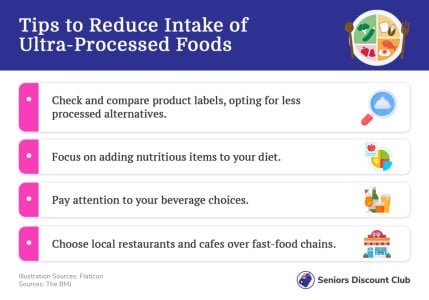Studies reveal the risk of higher intake of ultra-processed foods
By
Seia Ibanez
- Replies 5
The convenience of ultra-processed foods is undeniable. They're quick, easy, and often delicious.
But what if these foods were damaging your health and shortening your lifespan?
A recent study has revealed a shocking link between the consumption of ultra-processed foods and a host of adverse health conditions, including heart disease, mental disorders, and even early death.
The study, a comprehensive review published in The BMJ, comprised 45 meta-analyses involving nearly 10 million people.
'We found consistent evidence linking higher intakes of ultra-processed foods with over 70 per cent of the 45 different health outcomes we assessed,' said Wolfgang Marx, a Senior Research Fellow at the Food & Mood Centre at Deakin University in Geelong.

According to Heinz Freisling of the Nutrition and Metabolism branch of the World Health Organization’s International Agency for Research on Cancer, consuming just one serving or about ten per cent more ultra-processed foods per day could significantly increase the risk of developing or dying from dozens of health conditions.
‘This proportion can be regarded as “baseline”, and for people consuming more than this baseline, the risk might increase,’ Freisling, who was not involved in the study, said.
Ultra-processed foods are more than just 'modified' foods.
Dr Carlos Monteiro, Head of the Centre for Epidemiological Studies in Health and Nutrition at the University of São Paulo in Brazil, said ultra-processed foods are more than just 'modified' foods.
‘They are formulations of often chemically manipulated cheap ingredients such as modified starches, sugars, oils, fats, and protein isolates, with little if any whole food added,’ he said.
These foods are made enticing by using combinations of artificial flavours, colours, thickeners, and other additives that have been linked to imbalances in gut microbiota and systemic inflammation.
‘Strong evidence shows that a higher intake of ultra-processed foods was associated with approximately 50 per cent higher risk of cardiovascular disease-related death and common mental disorders,’ lead author Dr Melissa Lane, a postdoctoral research fellow at Deakin, said.
Cardiovascular disease encompasses heart attacks, stroke, clogged arteries, and peripheral artery disease.
Moreover, the study said the risk of anxiety could increase by up to 53 per cent and the risk of an early death from any cause by 20 per cent.
‘It's not surprising that there are a lot of studies that point to a positive association between ultra-processed food consumption and the risk of various disease outcomes,’ said Fang Fang Zhang, Associate Professor and Chair of the Division of Nutrition Epidemiology and Data Science at Tufts University in Boston.
'Ultra-processed foods are high in calories, added sugar, sodium, and low in fibre.’

'All of these have already been known to contribute to cardiometabolic health outcomes, weight gain, obesity, type 2 diabetes, and hypertension.'
The study also found highly suggestive evidence that eating more ultra-processed foods raised the risk of obesity by 55 per cent, sleep disorders by 41 per cent, development of type 2 diabetes by 40 per cent, and the risk of depression by 20 per cent.
However, Zhang raised doubts about the conclusions drawn from studies examining anxiety and depression, noting that these studies often focus solely on individuals who have already received a diagnosis of these conditions.
‘People who are having depressive symptoms or anxiety may seek out ultra-processed foods for various reasons such as self-comfort,’ she said.
‘It may not be that eating ultra-processed food puts you at high risk for depression—we cannot tell.’
Since the term 'ultra-processed food' was coined in 2009, nutritionists, researchers, and public health officials have grown increasingly concerned about the prevalence of such foods in Australia, the United States, the United Kingdom, Canada, and many developing nations.
‘I think it's like when we invented cars,’ Zhang said.
‘Yes, they bring us convenience, but if we use a car for everything and we don't exercise, we have problems. We need new strategies to bring down the consumption of ultra-processed food to a healthier level.’
According to experts, the solution to reducing ultra-processed foods is simple: buy real food and cook it at home.
However, giving up the convenience of ready-to-heat and ready-to-eat foods is difficult in today's fast-paced world.
Regulations by public health agencies and governments should be considered, such as front-of-pack warning labels; restriction of advertising, especially to children; and the prohibition of sales of ultraprocessed foods in or near schools and hospitals, all while making minimally processed foods more affordable and accessible.
Here are some practical suggestions to reduce your consumption of highly processed foods:

The convenience of ultra-processed foods comes at a high cost. While they may save time in the short term, their long-term effects on health can be devastating.
However, not every information about ultra-processed foods may be accurate.
Eric Robinson, Professor of Psychology at the University of Liverpool, discussed further ultra-processed foods, and he scrutinised myths and misleading claims of research related to these kinds of foods. You can read more about it here.
 What do you think about this study? Let us know in the comments below.
What do you think about this study? Let us know in the comments below.
But what if these foods were damaging your health and shortening your lifespan?
A recent study has revealed a shocking link between the consumption of ultra-processed foods and a host of adverse health conditions, including heart disease, mental disorders, and even early death.
The study, a comprehensive review published in The BMJ, comprised 45 meta-analyses involving nearly 10 million people.
'We found consistent evidence linking higher intakes of ultra-processed foods with over 70 per cent of the 45 different health outcomes we assessed,' said Wolfgang Marx, a Senior Research Fellow at the Food & Mood Centre at Deakin University in Geelong.

Studies show that higher ultra-processed food intake may lead to various heart conditions. Credit: Unsplash
According to Heinz Freisling of the Nutrition and Metabolism branch of the World Health Organization’s International Agency for Research on Cancer, consuming just one serving or about ten per cent more ultra-processed foods per day could significantly increase the risk of developing or dying from dozens of health conditions.
‘This proportion can be regarded as “baseline”, and for people consuming more than this baseline, the risk might increase,’ Freisling, who was not involved in the study, said.
Ultra-processed foods are more than just 'modified' foods.
Dr Carlos Monteiro, Head of the Centre for Epidemiological Studies in Health and Nutrition at the University of São Paulo in Brazil, said ultra-processed foods are more than just 'modified' foods.
‘They are formulations of often chemically manipulated cheap ingredients such as modified starches, sugars, oils, fats, and protein isolates, with little if any whole food added,’ he said.
These foods are made enticing by using combinations of artificial flavours, colours, thickeners, and other additives that have been linked to imbalances in gut microbiota and systemic inflammation.
‘Strong evidence shows that a higher intake of ultra-processed foods was associated with approximately 50 per cent higher risk of cardiovascular disease-related death and common mental disorders,’ lead author Dr Melissa Lane, a postdoctoral research fellow at Deakin, said.
Cardiovascular disease encompasses heart attacks, stroke, clogged arteries, and peripheral artery disease.
Moreover, the study said the risk of anxiety could increase by up to 53 per cent and the risk of an early death from any cause by 20 per cent.
‘It's not surprising that there are a lot of studies that point to a positive association between ultra-processed food consumption and the risk of various disease outcomes,’ said Fang Fang Zhang, Associate Professor and Chair of the Division of Nutrition Epidemiology and Data Science at Tufts University in Boston.
'Ultra-processed foods are high in calories, added sugar, sodium, and low in fibre.’

Ultra-processed food may also lead to an increased risk of mental health conditions. Credit: Shutterstock
'All of these have already been known to contribute to cardiometabolic health outcomes, weight gain, obesity, type 2 diabetes, and hypertension.'
The study also found highly suggestive evidence that eating more ultra-processed foods raised the risk of obesity by 55 per cent, sleep disorders by 41 per cent, development of type 2 diabetes by 40 per cent, and the risk of depression by 20 per cent.
However, Zhang raised doubts about the conclusions drawn from studies examining anxiety and depression, noting that these studies often focus solely on individuals who have already received a diagnosis of these conditions.
‘People who are having depressive symptoms or anxiety may seek out ultra-processed foods for various reasons such as self-comfort,’ she said.
‘It may not be that eating ultra-processed food puts you at high risk for depression—we cannot tell.’
Since the term 'ultra-processed food' was coined in 2009, nutritionists, researchers, and public health officials have grown increasingly concerned about the prevalence of such foods in Australia, the United States, the United Kingdom, Canada, and many developing nations.
‘I think it's like when we invented cars,’ Zhang said.
‘Yes, they bring us convenience, but if we use a car for everything and we don't exercise, we have problems. We need new strategies to bring down the consumption of ultra-processed food to a healthier level.’
According to experts, the solution to reducing ultra-processed foods is simple: buy real food and cook it at home.
However, giving up the convenience of ready-to-heat and ready-to-eat foods is difficult in today's fast-paced world.
Regulations by public health agencies and governments should be considered, such as front-of-pack warning labels; restriction of advertising, especially to children; and the prohibition of sales of ultraprocessed foods in or near schools and hospitals, all while making minimally processed foods more affordable and accessible.
Here are some practical suggestions to reduce your consumption of highly processed foods:
- Check and compare product labels, opting for less processed alternatives. For instance, consider switching from flavoured yogurt to plain yogurt with added fruit.
- Focus on adding nutritious items to your diet, such as fresh, frozen, or canned fruits, vegetables, beans, and legumes, alongside reducing processed options.
- Pay attention to your beverage choices. Sugar-sweetened drinks offer little nutritional benefit, so replace them with water.
- When dining out, choose local restaurants and cafes over fast-food chains, as they are less likely to offer heavily processed foods.

The convenience of ultra-processed foods comes at a high cost. While they may save time in the short term, their long-term effects on health can be devastating.
However, not every information about ultra-processed foods may be accurate.
Eric Robinson, Professor of Psychology at the University of Liverpool, discussed further ultra-processed foods, and he scrutinised myths and misleading claims of research related to these kinds of foods. You can read more about it here.
Key Takeaways
- Eating ultra-processed foods has been linked to a 50 per cent higher risk of cardiovascular disease-related death and common mental disorders, according to a new Australian review.
- The review assessed 45 meta-analyses on almost 10 million people and found consistent evidence of the negative impacts of ultra-processed foods on health.
- There was strong evidence suggesting a high intake of ultra-processed foods can increase the risk of obesity, sleep disorders, type 2 diabetes, and depression.
- Researchers recommended strategies to reduce ultra-processed food consumption include reading labels, choosing less processed alternatives, focusing on adding beneficial foods to one's diet and being mindful of beverage choices.







